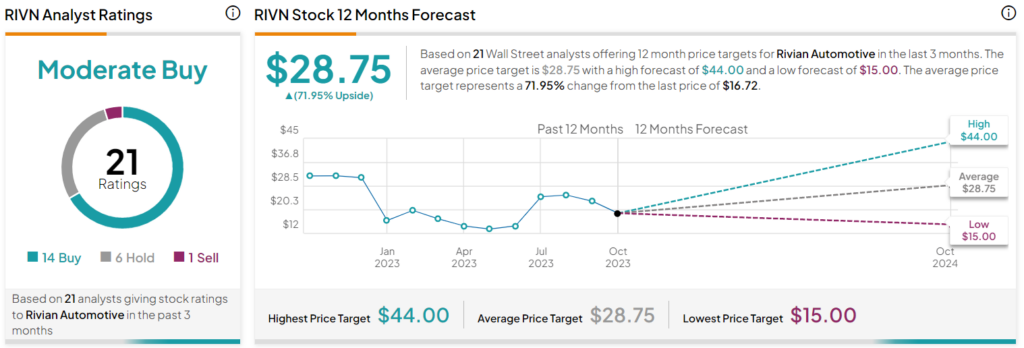Electric vehicle (EV) maker Rivian Automotive (NASDAQ:RIVN) has captured investors’ attention in a short span of time. Despite the stock’s 51% drop from its 52-week high, Wall Street remains bullish on the company’s long-term prospects. The company continues ramping up production, boosting its sales while keeping its balance sheet strong, which has impressed analysts who believe the stock has huge upside potential. Hence, I am bullish on Rivian stock, too.
Meet Your ETF AI Analyst
- Discover how TipRanks' ETF AI Analyst can help you make smarter investment decisions
- Explore ETFs TipRanks' users love and see what insights the ETF AI Analyst reveals about the ones you follow.

Improving Fundamentals
Rivian designs, manufactures, and sells electric vehicles and accessories. It produces the R1T pickup trucks and the R1S electric sport utility vehicles. The company has been working hard to compete with EV market giant Tesla (NASDAQ:TSLA) to create a sustainable automotive future.
In the second quarter, the company delivered 12,640 vehicles, up from 4,467 in the prior-year quarter. Total revenue increased 208% year-over-year to $1.12 billion. Rivian’s rapid revenue growth has helped it lower its losses. Its net loss fell to $1.2 billion in Q2 from $1.7 billion in the year-ago quarter.
Recently, Rivian reported that in Q3 2023, it manufactured 16,304 vehicles and delivered 15,564. For context, Rivian manufactured 7,363 vehicles and delivered 6,584 vehicles in the prior-year quarter. This represents a growth rate of 137% year-over-year in delivered vehicles.
Additionally, Rivian estimates Q3 revenue in the range of $1.29 billion and $1.33 billion versus $0.54 billion in the year-ago quarter. The company is confident it will be able to deliver 52,000 in annual production, as previously estimated.
Meanwhile, UBS forecasts production of 54,500 this year and “10x unit growth by 2030.” The firm also believes Rivian will not require additional capital until the end of 2025 and that the market should pay attention to its improving fundamentals. UBS upgraded RIVN stock to Buy from Neutral while lowering the stock’s target price to $24 from $26.
Furthermore, Rivian has a collaboration with Amazon (NASDAQ:AMZN) to have 100,000 electric delivery vans on the road by 2030. Amazon currently operates 10,000 electric delivery vans across the U.S.
Rivian’s Capital Position
Rivian has been burning cash heavily to boost production. According to preliminary estimates, it expects to end Q3 with $9.1 billion in cash, cash equivalents, and short-term investments, down from $10.2 billion at the end of Q2. The company believes this cash balance will suffice to fund its operations through 2025.
Yet, Rivian recently announced its intention to raise cash by offering $1.5 billion in green convertible senior notes due 2030 in a private offering to institutional buyers. This news alarmed investors, as these offerings can result in stock dilution, affecting the positions of existing shareholders.
To ease investors’ concerns, Rivian CEO RJ Scaringe told Reuters that the bond issuance doesn’t reflect concerns about the company’s financial health. The decision was simply to strengthen its balance sheet in the face of geopolitical tensions and be prepared for the near-term growth phase.
Furthermore, Street analysts also remain hopeful about Rivian’s growth. Needham analyst Chris Pierce stated, “The stock’s risk/reward is at its most compelling level since the firm introduced coverage in March on the strength of consistent execution in the first half of 2023, a projected strong Q3, and consensus out-year estimates that are not yet reflecting the company’s improved performance.” The analyst has a Buy rating on RIVN with a price target of $31.
Meanwhile, Truist Financial analyst Jordan Levy said, “The current equity market for ‘growthy’ EV names remains challenging, but Rivian is executing in areas that matter most for long-term success – ramping production, reducing costs, and investing in next gen technologies.” The analyst has a Buy rating for RIVN with a price target of $26.
With a low debt-to-equity ratio of 0.29, Rivian is capable of ramping up production and expanding manufacturing facilities. While Rivian won’t run out of cash anytime soon, it needs to be profitable before it completely depletes its cash reserves.
That said, according to Statista, EV market revenue could grow at a compound annual rate of 10.1% to around $907 billion by 2028. With more players in the EV market, Rivian will have to work harder to set itself apart from rivals and generate consistent profits.
Looking ahead, analysts expect Rivian’s revenue in the third quarter to come in at $1.31 billion. For the bottom line, analysts predict a loss of $1.34 per share. Rivian will report its Q3 earnings on November 7. What’s more, analysts expect Rivian will end 2023 with a 161.5% year-over-year increase in revenue to $4.3 billion and a loss of $4.91 per share.
Analysts also believe the company will be able to increase revenue further to $6.86 billion in 2024 while lowering its loss per share for the year to $3.15. Priced at 2.5 times forward sales, RIVN stock seems fairly valued now, given its revenue growth forecasts.
Is Rivian a Buy, Sell, or Hold, According to Analysts?
Turning to Wall Street, Rivian stock has a Moderate Buy consensus rating, with 14 Buys, six Holds, and one Sell rating assigned in the past three months. The average RIVN stock price target is $28.75, implying upside potential of 72% over the next 12 months.

The Key Takeaway
Summing it up, the rising star Rivian has made significant efforts to boost production and sales in a short period of time in an overcrowded EV industry. Only time will tell if Rivian will be able to establish a strong foothold in the EV market, given the fierce competition. But for now, with its fair valuation and attractive growth prospects, I share Wall Street’s optimistic outlook for Rivian.
















